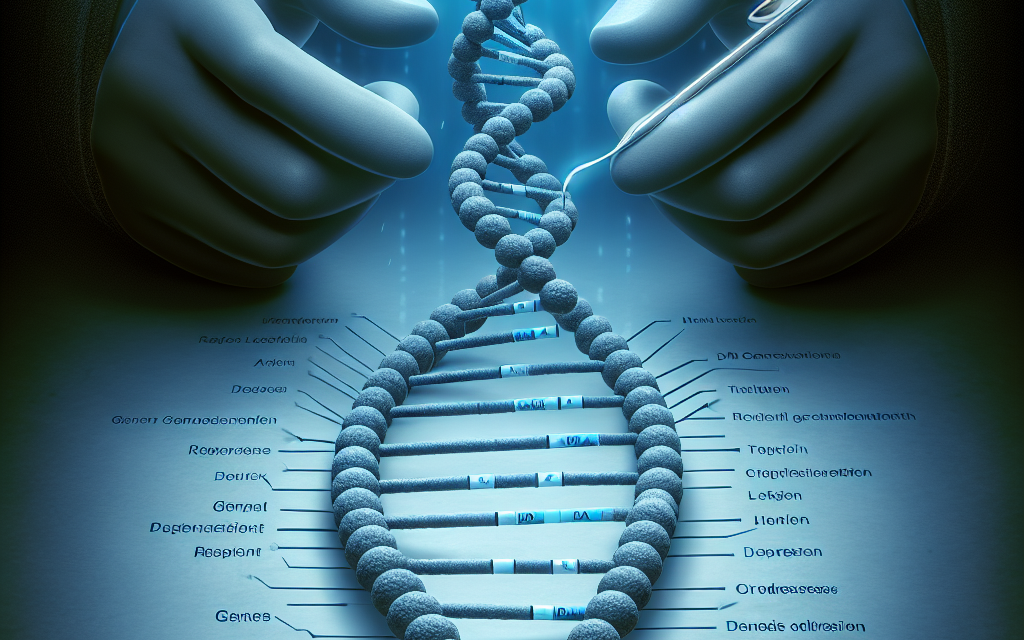Unraveling the Genetic Influences on Depression Risk
Depression is a complex mental health disorder that affects millions of people worldwide. While environmental factors and life experiences play significant roles in the onset of depression, emerging research suggests that genetics also contribute substantially to an individual’s risk of developing this debilitating condition. This article delves into the genetic influences on depression risk, exploring the biological underpinnings, the role of specific genes, the interaction between genetics and environment, and the implications for treatment and prevention.
The Biological Basis of Depression
Understanding the biological basis of depression is crucial for unraveling its genetic influences. Depression is not merely a psychological condition; it has a biological component that involves neurotransmitters, hormones, and brain structure.
Neurotransmitters such as serotonin, norepinephrine, and dopamine are critical in regulating mood and emotional responses. Imbalances in these chemicals can lead to depressive symptoms. For instance, low levels of serotonin are often associated with feelings of sadness and hopelessness. Research has shown that individuals with depression frequently exhibit altered levels of these neurotransmitters, suggesting a biological underpinning to the disorder.
Moreover, brain imaging studies have revealed structural and functional differences in the brains of individuals with depression. Areas such as the prefrontal cortex, amygdala, and hippocampus are often implicated in mood regulation. For example, the prefrontal cortex is responsible for decision-making and emotional regulation, and its reduced activity has been linked to depressive symptoms.
Genetic factors contribute to these biological processes. Twin studies have shown that the heritability of depression ranges from 30% to 40%, indicating a significant genetic component. This heritability suggests that certain genetic variations may predispose individuals to depression by influencing neurotransmitter systems and brain structure.
Identifying Specific Genes Associated with Depression
Research has identified several genes that may be linked to depression risk. One of the most studied is the serotonin transporter gene (5-HTTLPR). Variations in this gene can affect serotonin reuptake, influencing mood regulation. Studies have shown that individuals with the short allele of the 5-HTTLPR gene are at a higher risk for developing depression, particularly in response to stressful life events.
Another gene of interest is the brain-derived neurotrophic factor (BDNF) gene. BDNF plays a crucial role in neuroplasticity, which is essential for learning and memory. Variants of the BDNF gene have been associated with an increased risk of depression, as they may impair neuroplasticity and the brain’s ability to adapt to stress.
Additionally, the FKBP5 gene, which is involved in the regulation of the stress hormone cortisol, has been linked to depression. Variants of FKBP5 can affect how individuals respond to stress, making them more susceptible to depressive episodes. Research indicates that individuals with certain FKBP5 genotypes are more likely to develop depression after experiencing trauma or chronic stress.
While these genes provide valuable insights, it is essential to recognize that depression is polygenic, meaning that multiple genes contribute to its risk. Genome-wide association studies (GWAS) have identified numerous genetic variants associated with depression, highlighting the complexity of its genetic architecture.
The Gene-Environment Interaction in Depression
The interplay between genetics and environmental factors is a critical aspect of understanding depression risk. While certain genetic predispositions may increase vulnerability to depression, environmental stressors can trigger its onset. This gene-environment interaction is often illustrated through the diathesis-stress model, which posits that individuals with a genetic predisposition are more likely to develop depression when exposed to stressful life events.
For example, a study published in the journal “Nature” found that individuals with the short allele of the 5-HTTLPR gene were more likely to develop depression after experiencing significant life stressors, such as the loss of a loved one or job loss. This finding underscores the importance of considering both genetic and environmental factors in understanding depression risk.
Moreover, childhood adversity is a significant environmental factor that can interact with genetic predispositions. Research has shown that individuals with a family history of depression who also experienced childhood trauma are at a heightened risk for developing depression later in life. This suggests that early life experiences can exacerbate genetic vulnerabilities.
Additionally, socioeconomic status (SES) can influence the risk of depression. Individuals from lower SES backgrounds may face more significant stressors, such as financial instability and lack of access to mental health resources, which can interact with genetic predispositions to increase the likelihood of developing depression.
Implications for Treatment and Prevention
Understanding the genetic influences on depression has significant implications for treatment and prevention strategies. As research continues to uncover the genetic underpinnings of depression, personalized medicine approaches are becoming more feasible. Tailoring treatment based on an individual’s genetic profile could enhance the effectiveness of interventions.
For instance, pharmacogenomics, the study of how genes affect an individual’s response to drugs, is an emerging field that holds promise for treating depression. By analyzing genetic variations, healthcare providers may be able to predict which antidepressants are likely to be most effective for a particular patient. This could reduce the trial-and-error approach often associated with antidepressant treatment.
Moreover, understanding genetic risk factors can inform preventive strategies. Individuals with a family history of depression may benefit from early interventions, such as cognitive-behavioral therapy (CBT) or mindfulness-based stress reduction, to mitigate their risk. Additionally, promoting resilience and coping strategies in at-risk populations can help buffer against the effects of genetic predispositions.
Furthermore, public health initiatives aimed at reducing environmental stressors, such as poverty and social isolation, can play a crucial role in preventing depression. By addressing these factors, we can create a supportive environment that may help individuals with genetic vulnerabilities avoid the onset of depression.
Future Directions in Depression Research
The field of depression research is rapidly evolving, with new technologies and methodologies paving the way for deeper insights into the genetic influences on depression risk. One promising area of research is the use of polygenic risk scores (PRS), which aggregate the effects of multiple genetic variants to estimate an individual’s risk of developing depression.
By utilizing PRS, researchers can identify individuals at high risk for depression, allowing for targeted interventions and preventive measures. Additionally, advancements in neuroimaging techniques are providing researchers with a better understanding of how genetic variations influence brain structure and function in individuals with depression.
Moreover, the integration of genetic research with other disciplines, such as epigenetics and microbiome studies, is opening new avenues for understanding depression. Epigenetics examines how environmental factors can influence gene expression, providing insights into how lifestyle choices and experiences can modify genetic risk. Similarly, research into the gut-brain axis is revealing how gut health may impact mental health, potentially linking genetic predispositions to environmental influences.
As we move forward, interdisciplinary collaboration will be essential in unraveling the complexities of depression. By combining genetic research with psychological, social, and environmental studies, we can develop a more comprehensive understanding of depression and its risk factors.
Conclusion
Depression is a multifaceted disorder influenced by a complex interplay of genetic and environmental factors. While genetics play a significant role in determining an individual’s risk of developing depression, it is essential to consider the broader context of life experiences and environmental stressors. Understanding the genetic influences on depression can inform personalized treatment approaches, enhance prevention strategies, and ultimately improve outcomes for individuals at risk.
As research continues to advance, we are likely to uncover more about the intricate relationship between genetics and depression. By embracing a holistic approach that considers both biological and environmental factors, we can pave the way for more effective interventions and a deeper understanding of this pervasive mental health condition.





